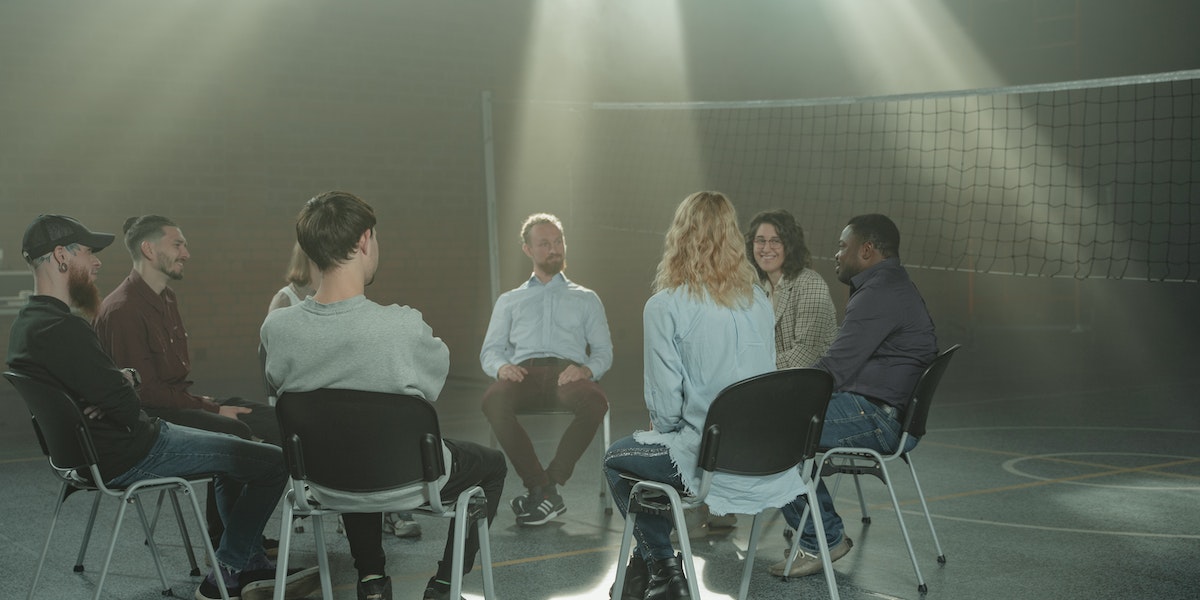Support groups bring together people who are struggling with similar issues. They are able to share their experiences and listen to others in a safe, supportive and non-judgmental setting. Through these exchanges, members of the group are able to offer and receive support and encouragement. These connections are incredibly important when going through treatment at an Arizona drug rehab.
At Wolf Creek Recovery, we start our clients in support groups right away. We know the benefits of these groups and how they can support the healing process. But we also know that many clients have questions about these groups – and some healthy skepticism. We realize it can be hard to open up to a group of strangers, but we also know the power of peer support!
What are Support Groups?
Support groups offer a safe space where you can share your experiences with others and get information that’s practical and constructive. You’ll receive a lot of encouragement, and you’ll learn how to cope with your challenges through shared experiences. Hearing from others will help you feel less alone in your struggles, while also developing skills like listening and empathy.
Where Can I Find Support Groups?
Many people are not aware that there are support groups in their area. The truth is, unless you are actively looking for them, you probably won’t know these groups are happening all around you! But, it’s important to know that there are tens of thousands of support groups nationally and globally, both in-person and online. There are groups for every problem and condition, and you can find one that accommodates your needs.
How Will a Support Group Help Me?
While it’s true that a support group isn’t a magic bullet for all of your problems, you will get some answers. Not only that, but you will receive a ton of support as you face your challenges and work through sensitive issues. This support is invaluable as you move through the recovery journey and reach new milestones.
Support groups also teach you what healthy relationships look like. Addiction makes it hard to have meaningful, rewarding relationships. The people in your support groups will be some of your first friendships after addiction, allowing you to work on interpersonal skills such as listening, verbal and nonverbal communication and teamwork.
Do I Have to Share My Story?
You will be encouraged to share your story, but most groups will not force you to do so. Instead, you can choose to speak as you feel comfortable. Well-run support groups also set boundaries and require members to show respect for each other. When you do share your story, you will be met with empathy and support.
Will I Feel More Depressed after Attending a Support Group?
Being vulnerable can feel scary, especially considering that addiction is such an isolating disease. It has probably been a long time since you opened up to someone! But once you release your emotions, you’re likely to feel uplifted and encouraged. Plus, being open and honest are two ingredients needed for healthy relationships.
Are There Different Types of Support Groups?
Yes! There are many different types of support groups, which allows you to find one that meets your needs and supports your journey. Some of the most common include:
- Mutual support groups. These groups are peer-led and generally cover a specific topic such as domestic abuse or grief. Group members share what’s working for them and inspire others to do the same.
- 12-step groups. 12-step groups are usually geared toward people with addiction. During these meetings, participants work through the 12 steps created by Alcoholics Anonymous. Like mutual support groups, 12-step groups are peer-led and free.
- Online support groups. When you can’t meet in person, online support groups can be valuable. They connect you to other people who are going through similar challenges. However, we recommend in-person support groups when possible.
- Therapy groups. Unlike peer-led support groups, therapy groups are led by a mental health provider. Usually, just a few people are in these groups, and there may be a cost associated with them.
Support groups are a large part of our Arizona rehab program. It’s perfectly normal to feel anxious or apprehensive about joining a group, but we assure you that they have plenty to offer! To learn more about our approach to treating substance use and mental health disorders, contact Wolf Creek Recovery today.

Finding purpose in pain is what Jonathon does best. He is a strong advocate for those suffering from substance use disorders. As a person in recovery, Jonathon knows how important it is to receive empathy and compassion. He recognizes that each person comes from a different set of circumstances and deserves to be valued and respected.
With a fresh perspective and compassionate attitude, Jonathon works closely with clients to help them let go of the past and know when to take necessary risks. The recovery process is ongoing, which means people need to move forward while applying the skills learned in treatment. Jonathon is a great motivator when it comes time for this!
Jonathon also places emphasis on the family unit and how it can make or break the recovery experience. Individuals with active, supportive families have far better outcomes. Jonathon realizes that it’s impossible to move mountains overnight, but with the right support team and positive attitude, anything is possible.












